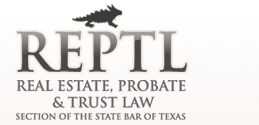Glenn Karisch’s Texas Probate Resources
Welcome to the Texas Probate Resources website, your source for information on estate planning, probate, and trust law in Texas. This site is owned and maintained by Glenn Karisch of Karisch Jonas Law, PLLC, in Austin, Texas. For information dating from before February 1, 2011, visit the legacy site at texasprobate.net.
Texas Probate
Enacted-Effective 9/1/11: HB 2722 -- State Medicaid program is payor of last resort
Caption: Relating to the state Medicaid program as the payor of last resort
Author: Perry
Bill History
Bill Text
Relevance: This bill requires the executive commissioner of the Texas Health and Human Services Commission to adopt rules to ensure that, to the extent allowed by federal law, the state Medicaid system is the payor of last resort and provides reimbursement only if, and to the extent, that other public or private sources of payment are not available.
Enacted-Effective 9/1/11: HB 2759 -- Recodification of guardianship statutes
Caption: Relating to the nonsubstantive revision of provisions of the Texas Probate Code relating to durable powers of attorney, guardianships, and other related proceedings and alternatives, and the redesignation of certain other provisions of the Texas Probate Code, including conforming amendments and repeals.
Author: Hartnett
Bill History
Bill Text
Relevance: This is the recodification of the guardianship portion of the Probate Code, as well as the power of attorney portion of the Probate Code, into the new Estates Code, to be effective January 1, 2014. This is intended as a nonsubstantive revision of those statutes and was prepared by the Legislative Council.
x-Did Not Pass: HB 2657 -- Changes to 2009 Estates Code recodification (decedents' estates)
Caption: Relating to nonsubstantive additions to and corrections in enacted codes, to the nonsubstantive codification or disposition of various laws omitted from enacted codes, and to conforming codifications enacted by the 81st Legislature to other Acts of that legislature.
Author: King, Tracy O.
Bill History
Bill Text
Relevance: This is a catch-all bill prepared by the Legislative Council to make corrections to various codes and to make conforming changes caused by other 2009 legislation. For probate attorneys, the most significant provisions amend those portions of the new Estates Code that reflect changes to the old Probate Code made in 2009. These changes are supposed to be nonsubstantive. The new Estates Code becomes effective January 1, 2014.
x-Did Not Pass: HB 2744 -- Procedural changes affecting guardianships
Caption: Relating to guardianships, including the functions of the Guardianship Certification Board.
Author: Lucio
Bill History
Bill Text
Relevance: This bill would amend 8 sections of the Probate Code to add procedural requirements in guardianships, including adding to the duties of the court investigator, requiring certain persons to be called as witnesses at hearings to appoint a guardian, adding to the list of persons entitled to notice of certain proceedings, requiring a full hearing with notice before a removed guardian is permanently replaced, and permitting a removed guardian who is a family member or friend to seek reinstatement if he or she is replaced by a private professional guardian.
REPTL bill tweaks independent administration
HB 2046 fine-tunes Texas statutes on independent administration for inclusion in the new Estates Code. While the changes are minor in the overall scheme of things, each change may be important in particular cases.
Rep. Will Hartnett
Will Hartnett, Author of HB 2046The bill, authored by Rep. Will Hartnett (R-Dallas), is the work of the Real Estate, Probate and Trust Law Section of the State Bar of Texas. It is part of the Section's multi-year effort to address certain key subjects prior to the change to the Estates Code on January 1, 2014. Most of the changes in HB 2046 were included in REPTL's 2009 legislation. The 2009 legislation (HB 3085) failed to pass because of a logjam at the end of the session.
Which rules apply to independent administrations?
Many of the changes clarify if certain rules applicable to dependent administrations also apply to independent administrations. For example, new Section 145B would affirmatively state the authority of an independent executor to act:
Unless this code specifically provides otherwise, any action that a personal representative subject to court supervision may take with or without a court order may be taken by an independent executor without a court order. The other provisions of this part are designed to provide additional guidance regarding independent administrations in specified situations, and are not designed to limit by omission or otherwise the application of the general principles set forth in this part.
Since Section 3(q) of the Probate Code includes "independent administrator" within the definition of "independent executor," Section 145B and other provisions referring to "independent executor" also include independent administrations of intestate decedents and independent administrations with will annexed.
Power of sale
HB 2046 makes substantive changes to the power of independent executors to sell property from the estate. New Section 145C sets out the general rules:
Independent executors have the power of sale of estate property set forth in the will without the need for court approval.
In addition, unless limited by the terms of a will, independent executors have the same authority to sell estate property that dependent administrators have, but without the need for court approval and without the need to follow the procedural requirements applicable to dependent adminstrations.
Third parties are protected and need not inquire into an independent executor's power of sale (A) if the power of sale is granted in the will or in the order appointing the independent executor or (B) if the independent executor provides an affidavit to the third party that the sale is necessary or advisable to pay expenses of administration, funeral expenses and expenses of last sickness of decedents, and allowances and claims against the estates of decedents.
The protection granted to third parties does not relieve the independent executor from any duty owed to a devisee or heir.
These rules do not limit the authority of the independent executor to enter into leases or borrow money.
One negative comment about these changes is that they expand the power of sale granted in the will to an independent administrator with will annexed. The power of sale may be viewed as a personal right granted to the independent executor named by the testator and should not extend to an independent administrator not named by the testator.
HB 2046 deals with the problem of independent administrations in cases where the will does not grant the power of sale by giving the applicant the opportunity to obtain the consent of all devisees or heirs to the power of sale. Section 145A provides that, if all devisees or heirs agree to give the independent aexecutor the power of sale, then the court may include that authority in the order appointing the independent executor. The power of sale issue must be raised prior to the appointment of the personal representative.
Creditors' claims in independent administrations
Section 294(d) notices and creditor response. Most of HB 2046's changes affecting creditors' claims clarify the procedural aspects of those claims. For example, under current law an independent executor may give a notice to unsecured creditors under Section 294(d) by certified or registered mail, return receipt requested, and claims which are not made within 4 months of the notice are barred. New Section 146(a-1) would require the Section 294(d) notice to include a statement that "a claim may be effectively presented by only one of the methods prescribed by this section." Section 146(b-4) would require the creditor to perfect its claim by (1) written instrument that his hand-delivered with proof of receipt or mailed by certified mail, return receipt requested with proof of receipt, to the independent executor or the executor's attorney; (2) a pleading filed in a new lawsuit with respect to the claim; or (3) a written instrument or pleading filed in the court in which the administration of the estate is pending. This means that communications from creditors which are not sent by certified mail will not be sufficient to overcome the Section 294(d) bar.
Matured secured claims. Practitioners have different opinions about how matured secured claims are handled in independent administrations. Some think that, having elected matured secured status, the creditor may not then exercise its nonjudicial foreclosure right and instead must rely on the independent executor to sell the secured property in due course of administration. Others think that a creditor with a matured secured claim retains the nonjudicial foreclosure right. Section 146(b-1) would clarify this issue by providing that creditors with matured secured claims do not have the power to conduct a nonjudicial foreclosure, but they retain the right to seek judicial relief or to execute a judgment against an independent executor. Section 146(b-1)(3) would provide a means by which the independent executor may collect the amount of the matured secured debt from the devisees. If the devisees do not pay the debt, then the independent executor must sell the property and pay the money as it is paid in a dependent administration.
Preferred debt and lien claims. Section 146(b-2) would make clear that a secured creditor electing preferred debt and lien status is free to conduct a nonjudicial foreclosure but must wait 6 months after letters testamentary are granted.
Tolling of the statute of limitations. Under current law, Section 16.062 provides that the death of a person against whom or in whose favor there may be a cause of action suspends the running of an applicable statute of limitations for 12 months after the death, but this period is shortened to the date of qualification if a personal representative qualifies within 12 months after death. HB 2046 would keep that general rule, but would add (in new Section 146(b-6)) that the running of a statute of limitations shall be tolled only by written approval of a claim signed by an independent executor, a pleading filed in a suit pending at the time of the decedent's death or a suit brought by the creditor against the independent executor. Thus, the presentation of a statement of claim or a notice with respect to a claim would not toll the running of the statute of limitations with respect to that claim.
Other claims procedures do not apply. New Section 146(b-7) would wrap up the statute regarding claims in independent administrations by making it clear that the other procedural provisions governing creditor claims in "supervised" administrations do not apply. To further avoid confusion, that section states specifically that:
Section 313 does not apply to independent administrations, so a creditor's claim is not barred by its failure to sue on a rejected claim within 90 days.
Sections 306(f) - (k) regarding secured claims do not apply to independent administrations.
Closing independent administrations
HB 2046 would retain the seldom-used closing affidavit procedure for closing an independent administration, although it calls those affidavits "closing reports" (Section 151). It would add a new alternative closing procedure. Under Section 151 (b) the independent executor may file a sworn notice of closing the estate, stating:
all debts have been paid to the extent permitted by the assets in the independent executor's possession;
all remaining assets have been distributed; and
the names and address of the distributees to whom property was distributed.
Jose Rodriguez, Author of SB 1198Before filing such a notice, the independent executor must give each distributee a copy of the notice and the filed notice must include signed receipts or other proof that all distributees have received a copy of the notice.
HB 2046 also changes the Estates Code
HB 2046 also contains parallel provisions putting these same changes into the new Estates Code. The changes noted above would become effective September 1, 2011, if HB 2046 is enacted.
Update: On March 4, 2011, Sen. Jose Rodriquez (D-El Paso), filed SB 1198 as REPTL's decedent's estates bill in the Senate.
Enacted-Effective 9/1/11: SB 1303 -- Changes to 2009 Estates Code recodification (decedents' estates)
Caption: Relating to nonsubstantive additions to and corrections in enacted codes, to the nonsubstantive codification or disposition of various laws omitted from enacted codes, and to conforming codifications enacted by the 81st Legislature to other Acts of that legislature.
Author: West
Bill History
Bill Text
Relevance: This is a catch-all bill prepared by the Legislative Council to make corrections to various codes and to make conforming changes caused by other 2009 legislation. For probate attorneys, the most significant provisions amend those portions of the new Estates Code that reflect changes to the old Probate Code made in 2009. These changes are supposed to be nonsubstantive. The new Estates Code becomes effective January 1, 2014.
Enacted-Effective 9/1/11: HB 2492 -- Adding adult incapacitated children to family allowance, etc.
Caption: Relating to the family allowance, treatment of exempt property, and an allowance in lieu of exempt property in the administration of a decedent's estate.
Author: Naishtat
Bill History
Bill Text
Relevance: HB 2492 would amend 12 sections of the Probate Code to add adult incapacitated children to the list of persons who may benefit from the family allowance, exempt property and allowance in lieu of exempt property.
x-Did Not Pass: SB 1299 -- Recodification of guardianship statutes
Caption: Relating to the nonsubstantive revision of provisions of the Texas Probate Code relating to durable powers of attorney, guardianships, and other related proceedings and alternatives, and the redesignation of certain other provisions of the Texas Probate Code, including conforming amendments and repeals.
Author: Duncan
Bill History
Bill Text
Relevance: This is the recodification of the guardianship portion of the Probate Code, as well as the power of attorney portion of the Probate Code, into the new Estates Code, to be effective January 1, 2014. This is intended as a nonsubstantive revision of those statutes and was prepared by the Legislative Council.
x-Did Not Pass: HB 2372 -- Assignment of judges to hear recusals
Caption: Relating to the recusal or disqualification of a statutory probate court judge and subsequent assignment of another judge.
Author: Hartnett
Bill History
Bill Text
Relevance: In 2007, SB 406 amended Section 25.00255 of the Government Code to make the presiding judge of the administrative judicial district, not the presiding statutory probate judge, responsible for appointing judges to hear recusals of statutory probate judges and to hear the case if a statutory probate judge is recused. HB 2372 would give the presiding statutory probate judge the authority to appoint judges to hear recusals and to replace disqualified judges, but it would prohibit the presiding judge from appointing another statutory probate judge from the same county to hear recusal motions.
IRS releases a draft Form 709 for 2010 gifts
The Internal Revenue Service has posted a draft version of the Form 709 United States Gift (and Generation-Skipping Transfer) Tax Return for gifts made during calendar year 2010. The draft is dated March 4, 2011, and can be seen here.
Since 2010 was, shall we say, an unusual year for gifts, it is helpful to see what the form may look like -- and not a moment too soon. The deadline for filing is April 15, 2011. While the deadline for filing a Form 706 federal estate tax return for decedents dying in 2010 was extended to September 19, 2011, the Tax Relief, Unemployment Insurance Reauthorization, and Job Creation Act of 2010 did not extend the deadline for filing gift tax returns.
Enacted-Effective 9/1/11: SB 1198 -- REPTL decedents' estates bill
Caption: Relating to decedents' estates.
Author: Rodriguez
Bill History
Bill Text
Relevance: This omnibus bill is supported by the Real Estate, Probate and Trust Law Section of the State Bar of Texas. It makes multiple changes to the Texas Probate Code affecting the estates of decedents. It also makes parallel changes to the new Estates Code. Changes include:
An option requiring only one signature of the testator and the witnesses on the will and self-proving affidavit (the old two-signature method still would be permitted). (Section 59)
Changes to the independent administration provisions of the Probate Code in anticipation of enactment of the new Estates Code, including addressing technical issues like the power of sale and creditor claims. (Sections 145 -- 151)
In independent administrations where there are no unpaid creditors, permitting the independent executor to deliver the inventory to the beneficiaries while filing an affidavit, not the inventory, with the court. (Section 250)
Confirming that a right of survivorship will not be presumed from joint ownership or joint tenancy of multi-party accounts and community property, legislatively overruling part of Holmes v. Beatty, saying "a survivorship agreement will not be inferred from the mere fact that the account is a joint account or that the account is designated JT TEN, Joint Tenancy, joint or other similar abbreviation." (Sections 439 and 452)
See "REPTL decedents' estates bill is worth a closer look" on texasprobate.com.
See "REPTL bill tweaks independent administration" on texasprobate.com.
Enacted-Effective 9/1/11: SB 1197 -- REPTL trust bill
Caption: Relating to trusts.
Author: Rodriguez
Bill History
Bill Text
Relevance: This bill is supported by the Real Estate, Probate and Trust Law Section of the State Bar of Texas and makes several minor or technical changes to the Texas Trust Code. It:
Contains a special extension of the disclaimer deadline to match the extension in the 2010 tax law. (Section 112.010)
Makes a slight change in the forfeiture (in terrorem) statute -- "just cause" must have existed for bringing the action, not "probable cause." (Section 112.038)
Allows waiver of notice of nonjudicial divisions and combinations of trusts. (Section 112.057)
Makes clear that a county court at law exercising the jurisdiction over a trust given it by Section 4B of the Probate Code has trust jurisdiction. (Section 115.001)
Makes venue in a trust case proper in a court in which an estate is pending. (Section 115.002)
Removes a beneficiary whose interest has been distributed, extinguished, terminated or paid from the list of necessary parties to trust litigation. (Section 115.011)
Makes a couple of technical changes to the Texas Uniform Principal and Income Act (Sections 116.005 and 116.205)
See "REPTL bills would make changes to trusts, guardianships and powers of attorney" on texasprobate.com.
Enacted-Effective 9/1/11: SB 1196 -- REPTL guardianship bill
Caption: Relating to guardianships and alternatives to guardianship for persons who have physical disabilities or who are incapacitated.
Author: Rodriguez
Bill History
Bill Text
Relevance: This bill is supported by the Real Estate, Probate and Trust Law Section of the State Bar of Texas. It makes multiple changes to the guardianship statutes in the Texas Probate Code. These include:
Changing the guardianship jurisdiction statutes in a way that is consistent to 2009's changes to the decedents' estates jurisdiction statutes. This is related to the enactment of the new Estates Code. (Sections 601, 605, 606A, 607A, 607B, 607C, 607D, 607E, and other technical changes)
Clarifies that an attorney ad litem appointed in a temporary guardianship continues to serve until a permanent guardian is appointed or the guardianship application is denied. (Section 646)
Makes it easier for the conservator of an adult disabled child to obtain a guardianship of that child. (Section 682A)
Fixes some technical problems caused by 2009 changes to the physician's certificate requirements for guardianships. (Section 687)
Eliminates the need to list other co-owners of property on guardianship inventories. (Sections 729 and 730)
Clarifies that a guardianship of the estate shall be settled when all of the guardianship assets are transferred to a pooled trust subaccount. (Section 745)
Changes the maximum age for a guardian of a person to "voluntarily" admit the ward to an inpatient psychiatric facility from 16 to 18. (Section 770)
Makes it possible to apply to the court for permission to transfer a portion of the ward's estate "as necessary to qualify the ward for government benefits." (Section 865)
Permits a person with a physical disability only to apply for creation of a guardianship management trust (which may be necessary to qualify for governmental benefits). (Sections 867, 868, 868C, 869 and 870) The court cannot require the trustee of a trust created for a person with a physical disability only to file annual or final accountings. (Sections 871 and 873)
Requires the trustee of a guardianship management trust to file an "initial accounting" (the equivalent of an inventory) within 30 days after the date a trustee receives property. (Section 870A
Clarifies who can apply for the establishment of a pooled trust subaccount and who is eligible for a pooled trust subaccount. (Sections 910 and 911)
See "REPTL bills would make changes to trusts, guardianships and powers of attorney" on texasprobate.com.






